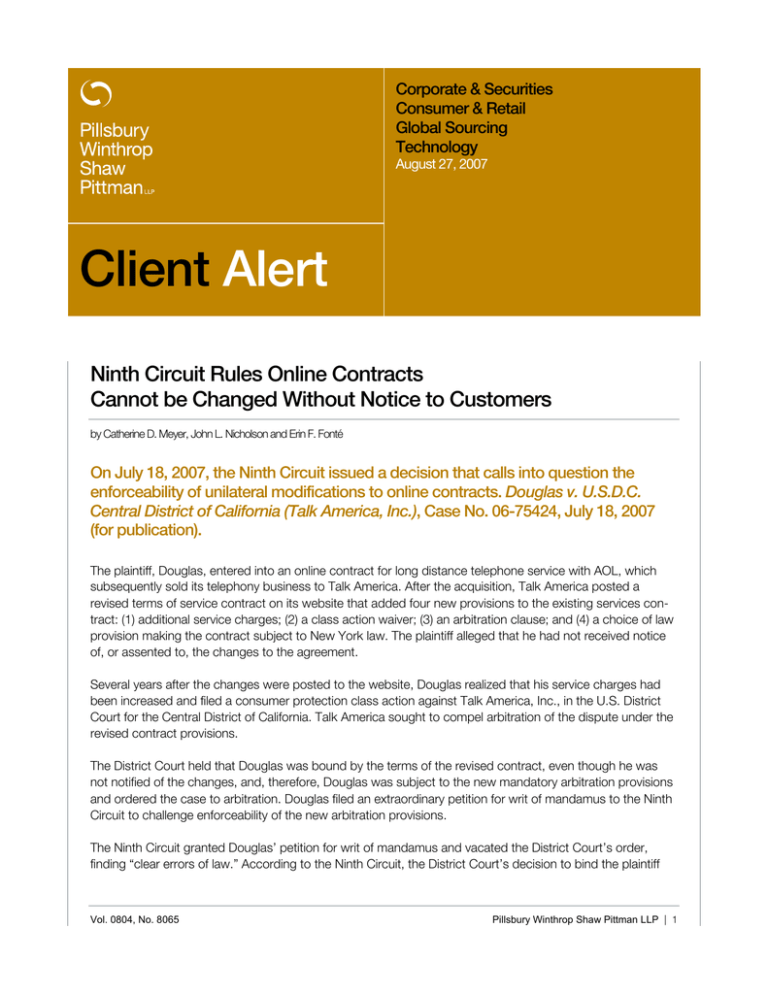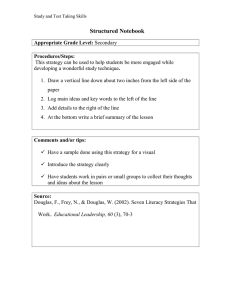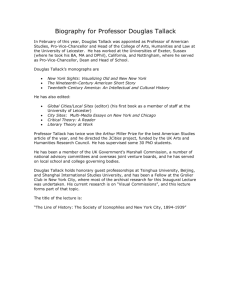
Client Alert
Corporate & Securities
Consumer & Retail
Global Sourcing
Technology
Corporate & Securities
August 27, 2007
Client Alert
Ninth Circuit Rules Online Contracts
Cannot be Changed Without Notice to Customers
by Catherine D. Meyer, John L. Nicholson and Erin F. Fonté
On July 18, 2007, the Ninth Circuit issued a decision that calls into question the
enforceability of unilateral modifications to online contracts. Douglas v. U.S.D.C.
Central District of California (Talk America, Inc.), Case No. 06-75424, July 18, 2007
(for publication).
The plaintiff, Douglas, entered into an online contract for long distance telephone service with AOL, which
subsequently sold its telephony business to Talk America. After the acquisition, Talk America posted a
revised terms of service contract on its website that added four new provisions to the existing services contract: (1) additional service charges; (2) a class action waiver; (3) an arbitration clause; and (4) a choice of law
provision making the contract subject to New York law. The plaintiff alleged that he had not received notice
of, or assented to, the changes to the agreement.
Several years after the changes were posted to the website, Douglas realized that his service charges had
been increased and filed a consumer protection class action against Talk America, Inc., in the U.S. District
Court for the Central District of California. Talk America sought to compel arbitration of the dispute under the
revised contract provisions.
The District Court held that Douglas was bound by the terms of the revised contract, even though he was
not notified of the changes, and, therefore, Douglas was subject to the new mandatory arbitration provisions
and ordered the case to arbitration. Douglas filed an extraordinary petition for writ of mandamus to the Ninth
Circuit to challenge enforceability of the new arbitration provisions.
The Ninth Circuit granted Douglas’ petition for writ of mandamus and vacated the District Court’s order,
finding “clear errors of law.” According to the Ninth Circuit, the District Court’s decision to bind the plaintiff
Vol. 0804, No. 8065
Pillsbury Winthrop Shaw Pittman LLP | 1
Client Alert
Corporate & Securities
to the terms of the revised contract even though he was not notified of the changes “reflects a fundamental
misapplication of contract law.”
“Issues of Law of First Impression”
The Per Curiam opinion of the Ninth Circuit held that the District Court’s order enforcing new contractual
terms when the customer was only given notice of the new terms by having them posted on the Internet
“’raises new and important problems’ and addresses ‘issues of law of first impression’” making this the “first
time any federal court of appeals has considered whether to enforce a modified contract” in these circumstances. The fact that the Ninth Circuit took the case and issued such an opinion gives insight into the
importance the Court sees in this issue.
The central focus of the Court’s opinion was on the basics of the contracting process: offer and acceptance.
Citing California authority that a contract cannot be modified unilaterally, the Court ruled that the altered provisions in the revised contract merely constituted an offer. Those provisions were not binding until accepted
by the plaintiff. Talk America argued that continued use of the service could be considered assent sufficient
to bind the plaintiff to the new terms. This was rejected flatly by the Court, stating that such assent could
only be inferred by use after the plaintiff received proper notice of the proposed changes. The Court cited
both treatise and New York case authority to the effect that an offer cannot be accepted until its existence
is known.1
Refusing to accept that Douglas could have become aware of the new contract terms if he had visited the
company’s website and examined the contract for possible changes, the Court refused to obligate a contracting party to periodically check his contract for possible changes. “Parties to a contract have no obligation to check the terms on a periodic basis to learn whether they have been changed by the other side.”2
Even if Talk America had provided notice to Douglas, the Court adopted the California Court of Appeal’s ruling in Badie v. Bank of America, 67 Cal.App. 4th 779 (1998) that a contract revision containing an arbitration
clause is not enforceable against existing customers even when they are given notice of the proposed revision by mail.
Can Online Contracts Ever be Unilaterally Modified?
Unfortunately, the Court was not asked to address whether there were any circumstances under which an
online contract could be modified unilaterally and thereafter enforced. The Court did not provide the language of the original contract, and there is no discussion as to whether that contract had a provision permitting unilateral modification effective upon posting on the website. If the original contract did not contain such
a provision, then Talk America’s unilateral modification of new terms to customers via posting the revised
contract would not be enforceable under general contract law. The Ninth Circuit’s opinion was also silent as
to whether the Court would disallow a contract provision requiring the user to check back frequently for
notice of changes to the contract. However, anyone considering this approach should bear in mind the Ninth
Circuit’s comments that without receiving notice a party would have to check the online contract every day
to determine whether there were any changes.
Open and Unresolved Online Contract Issues In Light Of the Douglas Decision
The potential impact of this decision on e-commerce and online agreements, from privacy policies to license
agreements to terms and conditions of service and more elaborate online agreements, could be widespread.
The Ninth Circuit recognized the importance of its decision, noting in the opinion that the decision could
Vol. 0804, No. 8065
Pillsbury Winthrop Shaw Pittman LLP | 2
Client Alert
Corporate & Securities
potentially affect “numerous service providers with millions of customers.”3 It is important to note, however,
that the Court’s decision is still subject to appeal, and it is uncertain whether other jurisdictions would follow
the Ninth Circuit’s decision in this case even if upheld on appeal.
If the decision survives appeal, it may be somewhat limited in scope because the Ninth Circuit ruling applies
California law and therefore may be limited to contracts affecting California residents or California businesses.
However, the Court’s basic contract law analysis and decision could well be adopted in other jurisdictions.
Additionally, the practical effect is more widespread because few businesses with online contracts limit their
customers to a particular state's residents and few separate their customers by state of residence.
As far as the formation of new online contracts is concerned, this ruling is not inconsistent with decisions in
other jurisdictions that have enforced online agreements where a link to the terms is provided with a notice
that use of the website/service will constitute consent to such terms.4 For greater certainty, a company can
require visitors/customers to affirmatively "click-through" to evidence their initial consent to the terms and
conditions of website use, or to other terms.
The Court’s decision leaves several issues surrounding the enforceability of online contract amendments
and modifications unresolved. Whenever modifications are being made to an existing online agreement, the
Douglas decision requires that customers who will be subject to the modified agreement be notified of the
modified terms and accept them. But the decision is silent as to what forms of customer notice the Court
would find acceptable. The ruling indicates that posting a notice on the website may not be sufficient
because there may be customers, like Douglas, who do not revisit the site, yet are still intended to be bound
by the modified agreement.
Where the services can only be obtained by visiting the website (such as a site providing music or software
downloads, for example), it is uncertain under this ruling whether notice of changes posted on the site would
be sufficient, even if a company could ensure that the notice would be viewed by all customers. For onlineonly services, as well as for services that can be used without accessing a website, it is unclear from the
decision whether email notice to customers of contract changes would constitute acceptable notice to this
Court, even if the email described the modified contract provisions and/or provided an email link to the
revised contract. Finally, if email notice were deemed to be insufficient by this Court, or there were instances
where a company did not have email addresses for some customers, it is unclear whether this decision goes
so far as to require that notice of changes be sent via regular mail.
Also left open is the issue of long-term service contracts that have early termination fees, such as cell phone
contracts. Given the Court’s analysis, it is possible that modifications to the terms of those contracts would
be enforced only if the customer were permitted to terminate without penalty if the customer was not willing
to accept the modifications. The Court's analysis of procedural unconscionability would need to be
addressed in such situations to determine whether the existence of the termination fee raised the contract
modification to the status of a "take-it-or-leave-it" offer, which is disfavored by this Court and many others.
Open Questions Create Uncertainty of Approach
Given the many issues left open or unaddressed by the Court, handling modifications to online contracts in
the wake of Douglas will prove both challenging and uncertain. Including a provision in an online contract
that changes to the terms could be made following mailed notice to its customers might satisfy the Court’s
objections in Douglas. Such mailed changes are common practice in the financial services industry. Unfortu-
Vol. 0804, No. 8065
Pillsbury Winthrop Shaw Pittman LLP | 3
Client Alert
Corporate & Securities
nately, such a process might be economically prohibitive for many online services, and could dramatically
change the cost-benefit analysis of the value of changing the terms of service.
Moving from printed, mailed notice into the electronic realm will be even more challenging. Companies will
need to consider the nature of their service, including whether it can only be used while a customer is actually connected to the service (“access-only” services, such as a music or software download service, or webbased email service), or if the service can be used while the customer is not connected to the service or even
offline (“non-access” services) and the Court’s indication that the customer must receive notice of any
changes in service to determine whether email or website posting may be adequate notice.
Each company will need to evaluate its options in light of the uncertainty created by the Douglas decision, as
well as the economic and customer relations issues created by the possible options for implementing modifications to online agreements. Companies may also consider decreasing the frequency with which they have
traditionally modified their online terms of service, bundling the updates into a single “release” of the new version to be more efficient.
If the Douglas decision survives appeal and indeed marks a shift in online contract law, companies should
review their online agreements and put into place procedures to increase the likelihood of the enforceability
of any future changes to those agreements. Because of the uncertain environment created by the Court in
Douglas, best practices for online contracting may take time to evolve. Companies providing online services
will need to evaluate their current contracting practices and make careful determinations regarding the need
for changes to their online contracts, the methods by which they will notify their customers, the economic
costs and practical business impacts of providing notice in varying ways, and the impact such notification
and acceptance processes may have on their customer retention. In addition, a number of companies may
also need to examine the enforceability of amendments to online agreements made without notice or assent
prior to the Court’s ruling. The decision does not address the ability of, or mechanism for, a company to
obtain ratification of such interim amendments.
For further information, please contact:
Catherine D. Meyer (bio)
Los Angeles
+1.213.488.7362
catherine.meyer@pillsburylaw.com
John L. Nicholson (bio)
Washington, DC
+1.202.663.8269
john.nicholson@pillsburylaw.com
Erin F. Fonté (bio)
Los Angeles
+1.213.488.7104
erin.fonte@pillsburylaw.com
This publication is issued periodically to keep Pillsbury Winthrop Shaw Pittman LLP clients and other interested parties
informed of current legal developments that may affect or otherwise be of interest to them. The comments contained herein
do not constitute legal opinion and should not be regarded as a substitute for legal advice.
© 2007 Pillsbury Winthrop Shaw Pittman LLP. All Rights Reserved.
Vol. 0804, No. 8065
Pillsbury Winthrop Shaw Pittman LLP | 4
Client Alert
Corporate & Securities
J
1
See Douglas v. U.S.D.C. Central District of California (Talk America, Inc.), Case No. 06-75424, July 18, 2007 at 5.
2
Id., at 4.
3
See id. at 11.
4
See, e.g., Dewayne Hubbert v. Dell Corp., 359 Ill. App. 3d 976, 835 N.E.2d 113 (Ill App 5 Dist., August 12, 2005) app. denied,
217 Ill. 2d 601, 844 N.E.2d 965 (Ill. 2006), where an Illinois intermediate appellate court, applying Texas law, held that
purchasers of Dell computers were bound by Terms and Conditions of Sale posted and available on Dell’s website at the time
of purchase, notwithstanding the fact that they were only available via hyperlink on Dell’s site, and further, that the consumer
did not have to affirmatively click an “I accept” icon to indicate his assent to be bound thereby. The Court held that by
purchasing their computers online, plaintiffs entered into an online contract which included the Terms and Conditions, because
they were advised on Dell’s website that their purchases were subject thereto.
Vol. 0804, No. 8065
Pillsbury Winthrop Shaw Pittman LLP | 5



